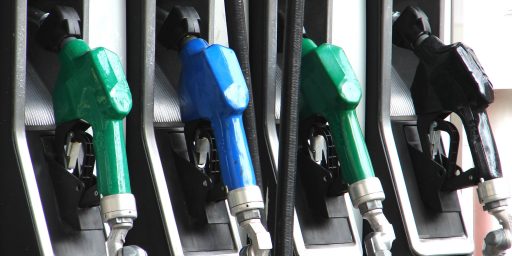Pessimism or Optimism?
Over at the Oil Drum there is an interesting post. I found two things interesting. The first is how the post indirectly notes that people all too often take the latest data and give it way too much weight.
There is a rather odd side to human nature. Take a problem, present it to the audience in its maximum horror and suggest it is about to happen, then ameliorate it a little, and tell everyone how the world is not nearly as bad as it is painted. And everyone agrees that things are looking up. But you are still facing a very bad situation – only the way the news has been presented makes it seem that there is no longer a problem.
Consider that, just yesterday, Texas was facing the third worst storm in known history and things looked very dire. The storm has now got just a bit less intense and folk are already talking about Houston having “missed the bullet.” All of a sudden a Category 4 hurricane becomes news enough to ease oil prices.
We have seen this over the past year with oil prices themselves. Prices rise from $30 to $40 to $50 and then they fall back $3 and we discuss the “collapse of the price of oil.” It rises to $60 and then $70 and then slips $4 and suddenly “the crisis is over.”
I think to some degree this is right. People look at the most recent data and think, “Okay, it’s over now,” when in reality, it is minor fluctuation around a trend.
The rational thing to do is to consider all the data. The problem is that this is hard to do. One way to do it is the Bayesian method. The Bayesian method requires working with conditional probabilities and that is a pain in the butt for many people. For example, suppose we want to make an inference about prices. Ideally we’d like to know the following,
That is, what is the probability that price at time t+1 (this could be tomorrow, next week, next month, etc.) will be P given information Dt. If you are already suffering from MEGO (My Eyes Glazed Over) then I’ve proven my point. People don’t understand this, they don’t want to understand this, and hence generally wont use it in formulating inferences. So they rely on rules of thumb, and one problem is that a rule of thumb that is good in situation X, could be bad in situation Y.
I have no problem with this part of the post from the Oil Drum, mainly because I agree with it. What I do have a problem with is the implication that Prof. Hamilton has made the following argument,
Unfortunately the problems of the oil and gas loss in the Gulf will not let themselves be so easily moved from the front pages. The likely losses are identified in the posts that Prof G is so assiduously been keeping current over the past few days. Sadly they will become reality over the weekend. And the impact will then develop over the next couple of weeks as crude oil production fails to return to its early Summer levels, while needs start to go unmet. (And with due deference to Econbrowser those who have to heat a home in Boston this winter will not willingly forgo that need because the price is higher than last year).–emphasis added
The implication that either you heat your home or you don’t is a specious one. Sure if the price rises people aren’t suddenly going to say, “Oh, well I’ll just turn off the heat in the middle of December.” But there are things that can be done such as lowering the thermostat and putting on a sweater, or lowering the thermostat quite a bit at night and getting out a couple of extra blankets. People said the same thing about electricity here in California, but guess what? People do respond to price signals in regards to electricity. I know, I’ve seen the data as rates change and watched people move from direct access (buying electricity from an independent power producer) back to their default provider (their local investor owned utility) back to direct access, and so on (the utilities have their rates set by the CPUC with balancing accounts whereas the indpenedent power producers can vary their price depending on their costs, so there are often periods where there is a price differential). Just because a price is highly inelastic (not that responsive to price) doesn’t mean there is no response (perfectly inelastic). As one commenter put it, the argument is basically a strawman argument.






Steve, I think to some degree you are absolutely right, but to the average guy or gal out there buying a gallon of gas the all agree on one thing, “The price is to high” These same guys and gals then ask a simple question and that is “Why is the price $ 3.00 per gallon” Therein lies the entire crux of the current situation with the oil industry and the price of a gallon of gasoline.
Right now, there are eight states conducting investigations on price gouging by the oil companies and no doubt there will be more. I think the states will really push this one because there is so much pressure on the states to eliminate their fuel tax that they will pull every string to keep their tax revenue and make the oil companies pay instead of themselves.
Right now, there is oil coming out of the big oil company’s ears and they just can not provide an explanation for the high price of crude, there sure is no shortage, Today, we have several million barrels of crude in the Strategic Petro Reserves that are available, and the Saudis and OPEC say there is about 1 million barrels per day production over demand. While I may agree that with some reduced refining capacity due to Katrina and now Rita, there may be some shortages and the prices will most likely go up, but, the average person buying that gallon of gas will not tolerate the high price for long. Most everyone you talk to today firmly believe that they are getting ripped off by the oil companies and they are complaining to the politicians. The politician will do something to save his rear end come next election, so, I think we will see some higher price, I look for the price to dramatically drop sooner rather than later.
Also, there is no doubt that some people will go cold this winter because of the high heating costs. Do you think the politicians will stand for that? I think they will until the media finds a story of someone froze to death because of a lack of money to pay to heat their home.
There is no logical reason for the price oil to be what it is today. EXCEPT GREED.
In Maine Boston’s winter weather seems balmy. Higher energy prices will be a hardship for a lot of people. Unfortunately the media give a free ride to politicians who talk about reducing carbon consumption because of global warming on Mondays and then rail against high fuel prices on Wednesdays, while coming up with excuses for not cutting fuel taxes on Tuesdays. Economic illiteracy on the part of politcians, the media, and the public has a lot to do with this; but it is also the short attention span and laziness of media and politicians. It hurts to say this because of the hardship it will cause for some, but these higher energy prices are the only way to call the bluff of the Kyoto crowd.